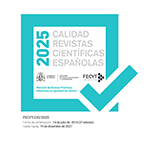“De-emplotting” History: Genre, Violence and Subversion in Christopher Marlowe’s "Edward II"
Abstract
Taking into consideration Hayden White’s seminal argument about historical emplotment, and relating such notion to traditional explanations about the ritualistic structure of Tudor historiography, this article reassesses Chistopher Marlowe’s Edward II (ca. 1592) from the perspective of genre in order to expose how the play counter-effects the dominant ideology of the Tudor regime concerning royal authority. The encodation of historical events into the icon of romance, and the dramatic superimposition of tragic conventions upon such an iconic structure arguably confront two opposing modes of representing violence onstage, which determines a theatrical interplay of power discourses that arguably dramatizes the desacralization of kingship through the immanent representation of its sacredness. As this article argues, these dialectics articulates the political anxieties of Renaissance England from within generic categories, and it effectively subverts the well-established strategies of legitimization that idealized (and rewrote) violence, history and monarchy in Tudor England.
Downloads
Article download
License
In order to support the global exchange of knowledge, the journal Complutense Journal of English Studies is allowing unrestricted access to its content as from its publication in this electronic edition, and as such it is an open-access journal. The originals published in this journal are the property of the Complutense University of Madrid and any reproduction thereof in full or in part must cite the source. All content is distributed under a Creative Commons Attribution 4.0 use and distribution licence (CC BY 4.0). This circumstance must be expressly stated in these terms where necessary. You can view the summary and the complete legal text of the licence.









